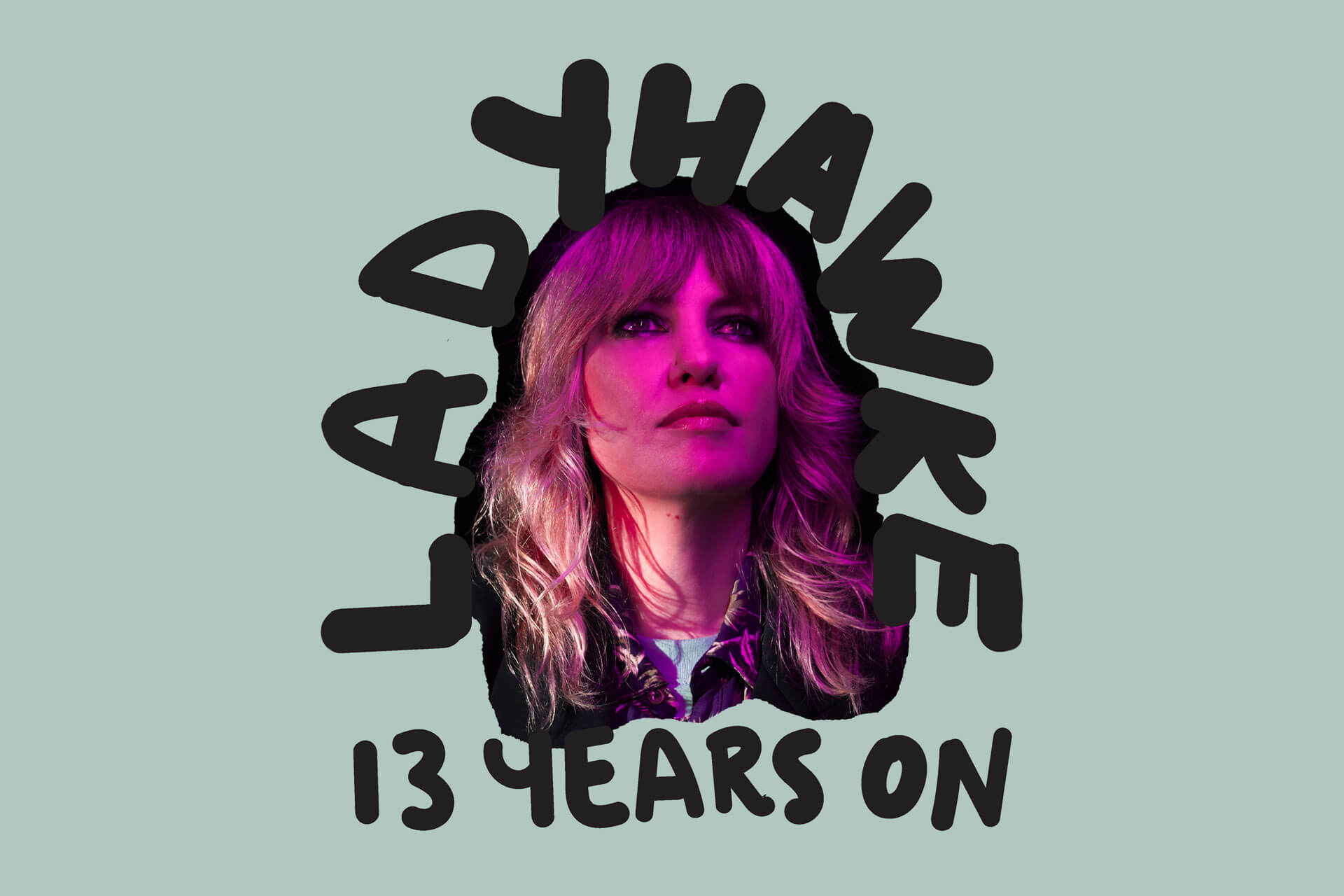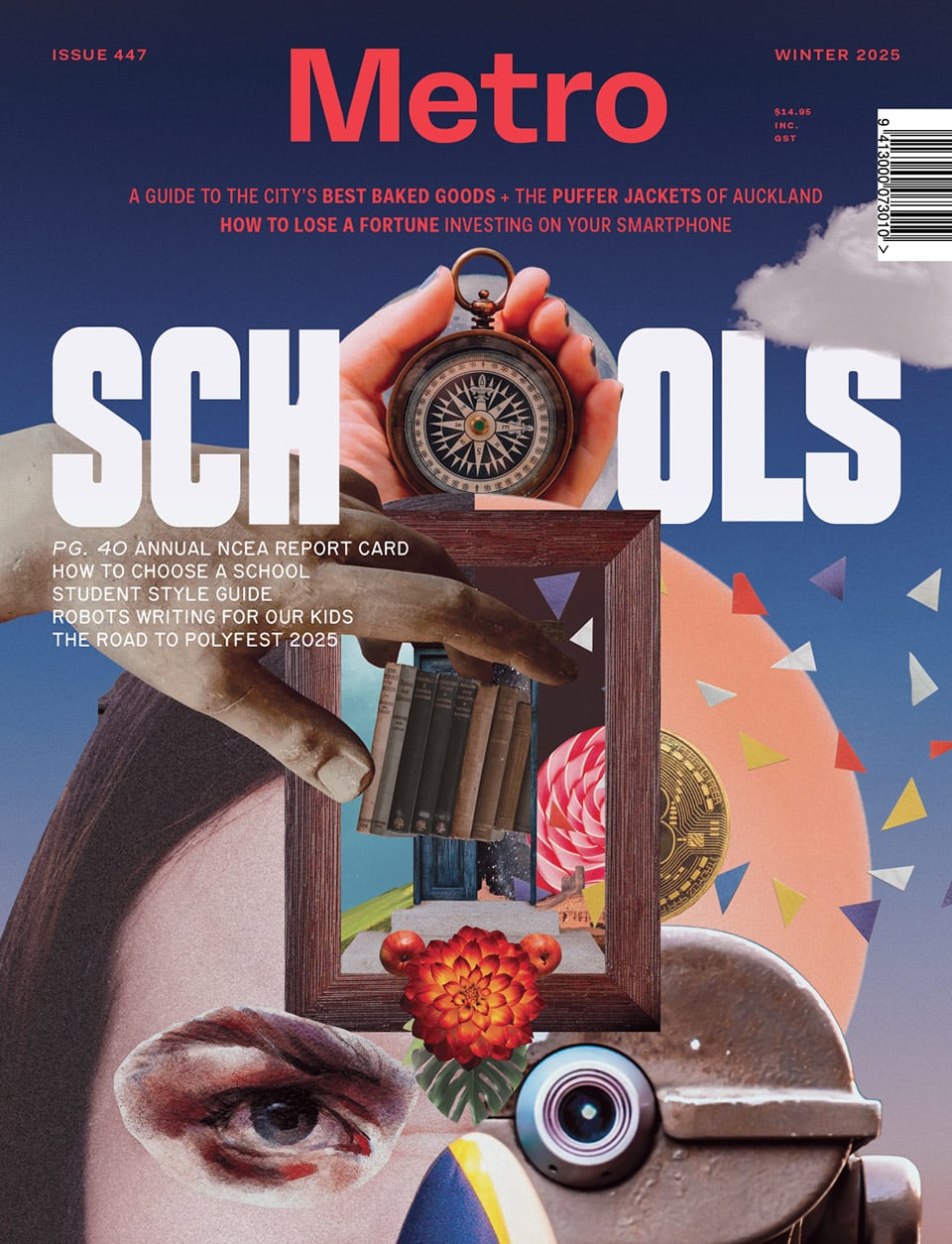Oct 7, 2021 Music
When Pip Brown sits down for our Zoom call, it’s almost 10pm. She’s been trying to get her three-year-old daughter Billie Jean to sleep, and it’s pushed our interview back. “I’ve been driving her around for the last hour,” she says, bleary-eyed on the couch. “I’m quite wrecked, actually. I’ve just been lying in bed with her, making up all these stories,” she laughs.
It’s a scene that makes me thankful we didn’t just meet in a cafe. Somehow over Zoom, it feels more in-person than you’d usually get with an artist. No illusion of put-togetherness, no fake chatter or pretend smiles. She’s simply Pip — unfiltered, low key and a bit worn out from the everyday effort of parenthood.
But when she takes to the stage, electric guitar in tow, Ladyhawke comes alive. Since 2008, when the release of My Delirium propelled her into the mainstream, her catchy, synth-pop beats have seen her tour around the globe. Ladyhawke’s long-awaited fourth album, Time Flies, is her first in five years, and boasts the same brilliant concoction of joyful synthesisers, guitar shredding and 80s rock energy that has kept fans patient in the interlude. “The name is kind of a joke about how long it’s been since my last record,” she says. “But it honestly feels like the blink of an eye.” Although it’s now 13 years since her first album, her new record draws on feelings similar to those she experienced as an up-and-comer. “I feel like I’ve gone right back around again to my first record. I’ve gone for this sort of nostalgia again and a lot of the same feelings I was drawing on then.”
Time Flies was meant to be released back in 2019, before the pandemic threw a spanner in the works. The album has entailed many collaborations, but a large chunk was made with producer powerhouse Josh Fountain, who’s well known for his work with Benee. “Me and him just hit it off,” Brown says, describing how she approached him before even having any lyrics for the album. “I knew it was going to work when, in our first session, we realised we’d been sitting there talking for three hours and done no music. That’s always a really good sign for me, and that’s how I gauge a good working relationship: it has to be a friendship as well.”
When we discuss her process, and how the lyrics come about, it’s clear Brown is a musician at heart, before singing comes into the mix. She started out as a guitarist — “shredding” was her first love. “The lyrics are always the last thing for me,” says Brown, who generally uses metaphors in song, rather than personal anecdotes. She and Fountain would make music together, she’d play some riffs on the guitar, then the melody would come after. “I think about how the song makes me feel,” she says, “because I always get certain energies from music. It can make me see all these different colours and feel nostalgic or excited or energetic, or I think about a relationship and then go from there.”
Some of those feelings include musings on her own youth, which saw her grow up queer in a Catholic school. It shaped the recently released track Guilty Love, created with Georgia Nott from Broods. The single, which features on the upcoming album, alludes to the shame Brown felt being queer within her religion, with lines such as “I just pray to be free” a nod to the suffocating dichotomy.
When I ask if her own childhood experiences shape how she raises Billie Jean, she confirms that they do. “I’ve had this thing where I don’t want anything to be taboo around her. I want to be open and honest and send her to a public school rather than a religious school,” she admits. “But I have moments when even though we’re in a different time now, I still worry. Kids are still dicks and they say stupid shit; I worry about mean kids finding out Billie Jean’s got two mums. But she’s already showing that she’s pretty tough and can hold her own.”
With Brown having lived overseas for 14 years before returning to Aotearoa to give birth to Billie Jean and raise her here, it’s only fitting the latest album was made here and afar. Some tracks were made in Auckland, others date to her time in Los Angeles, her old home. While she misses the city, she says she couldn’t live there. The sunshine was “maddening” — a description she offers so matter-of-factly that I laugh. There’s a certain irony to a sunny day being a source of angst. “When you live there, you start to feel crazy, like you’re in some sort of Groundhog Day.” The contrast between LA and London, her previous home, was immense. One was too blue, one was too grey. She says New Zealand is a “happy median”.
Throughout her career, mental-health breaks have felt necessary. Being able to have control over when she releases music has been important, a sort of catharsis, and she’s taken long breaks between each album. After her first record, the infamous pressure of the music industry amped up, and the desire from others to manufacture her look increased. “I always knew I was a little bit odd and I didn’t seem to fit anywhere,” she says. “I noticed people definitely tried to make me fit into boxes.” People would comment that she was a “tomboy” or question why she wore men’s clothes. “You go from just being you, to overthinking every step you make. I felt like I was being judged and scrutinised for just being me.”
The pressure she felt to conform early on in her career still surfaces. “I think I’m still a little bit damaged from those years,” Brown reflects. “I’m way more at ease with myself than I was back then, but I still sometimes find I question the way I look, and that’s only because of what happened to me back then — being told I shouldn’t wear what I was wearing or people making a big deal about the way I looked and the clothes I wore. It really affected me because I had never cared about it before, then all of a sudden I was sort of made to care about it.” She’s never felt as though she belonged. “I never felt good enough,” she says. “I think I had and still have imposter syndrome. Why do we torture ourselves?”
In recent years, Brown has found solace and community in her passion for gaming, joining the online streaming platform Twitch. It’s been an outlet since she was a kid, when she says she had an “abnormal interest” in it. Since her Ladyhawke success, and health battles such as anxiety, a cancer scare and post-natal depression, gaming has been an escape. “Playing a video game for me is a way to switch off from everything. You just get involved in a story and play,” she says.
Wife Madeleine Sami laughs that Brown’s rock-star money is spent on games. “As soon as I started making proper money, I was like, ‘Give me all the games, give me all the consoles!’” she says. Her Twitch crew have plans to meet in person one day, when the state of the world allows. One of them is actress Shannon Woodward, who initially inspired Brown to join the platform. “I always thought it was a place for boy gamers to troll women. But seeing other women streaming really gave me the confidence to do it,” she says. “It’s so nerdy, but it’s been amazing. I’ve really found my people.”






